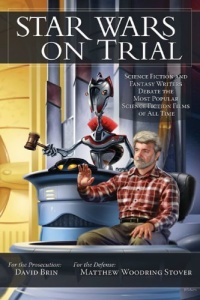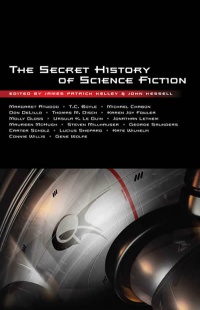Well, it’s done. The sci-fi legend of our generation is now complete. Our parents had Dr. Strangeglove and 1984. Their parents were transfixed by H. G. Wells. The generation before that had Jules Verne. And we got Star Wars….
Title: Star Wars on Trial: Science Fiction and Fantasy Writers Debate the Most Popular Science Fiction Films of All Time
Editors: David Brin, Matthew Woodring Stover
Year: 2006
Rating: 3 out of 5 stars
 Love it or hate it, most people would have to agree that the Star Wars saga is undoubtedly one of the greatest phenomena of modern pop culture. Of course, with popularity comes criticism, and Star Wars is no exception. Is it mythically rooted drama with something to say, or merely brainless eye candy? Is it science fiction or fantasy? Are the spinoff novels a good thing or an abomination? What about the politics, philosophy, and ethics of that galaxy far far away? These and many other questions have been discussed by fans and critics for years, and are discussed yet again in the present volume. Part of the Smart Pop book series from BenBella Books, Star Wars on Trial looks at this cinematic juggernaut from every possible angle (including a few unexpected ones). The book is laid out as a courtroom drama, with David Brin as the prosecutor, Matthew Woodring Stover as the defense, and a droid judge to maintain order. There are also essays or “briefs” submitted by many other SF/F authors on both sides of the debate (see the tags for a full list). This courtroom format comes across as silly sometimes (all right, most of the time), but the book does a good job of bringing a wide variety of opinions to bear on the subject.
Love it or hate it, most people would have to agree that the Star Wars saga is undoubtedly one of the greatest phenomena of modern pop culture. Of course, with popularity comes criticism, and Star Wars is no exception. Is it mythically rooted drama with something to say, or merely brainless eye candy? Is it science fiction or fantasy? Are the spinoff novels a good thing or an abomination? What about the politics, philosophy, and ethics of that galaxy far far away? These and many other questions have been discussed by fans and critics for years, and are discussed yet again in the present volume. Part of the Smart Pop book series from BenBella Books, Star Wars on Trial looks at this cinematic juggernaut from every possible angle (including a few unexpected ones). The book is laid out as a courtroom drama, with David Brin as the prosecutor, Matthew Woodring Stover as the defense, and a droid judge to maintain order. There are also essays or “briefs” submitted by many other SF/F authors on both sides of the debate (see the tags for a full list). This courtroom format comes across as silly sometimes (all right, most of the time), but the book does a good job of bringing a wide variety of opinions to bear on the subject.
The main topics for debate are presented as a series of charges, with each charge then being addressed by both prosecution and defense. The charges are as follows:
1. The politics of Star Wars are anti-democratic and elitist.
2. While claiming mythic significance, Star Wars portrays no admirable religious or ethical belies.
3. Star Wars novels are poor substitutes for real science fiction and are driving real sf off the shelves.
4. Science fiction filmmaking has been reduced by Star Wars to poorly written special effects exravaganzas.
5. Star Wars has dumbed down the perception of science fiction in the popular imagination.
6. Star Wars pretends to be science fiction, but is really fantasy.
7. Women in Star Wars are portrayed as fundamentally weak.
8. The plot holes and logical gaps in Star Wars make it ill-suited for an intelligent viewer.
If those accusations sound overly negative, let me put your mind at ease by saying this book is not merely an exercise in Star Wars bashing. Brin and his supporters do come on strong and put the screws to George Lucas and his creation (and rightly so, I think). But on the other hand, Stover and his defense team manage to hold their ground quite admirably. In fact, I would venture to say that most readers who begin reading this book with a preconceived bias, either for or against these movies, will likely come away with the feeling that things aren’t quite as simple or clear-cut as they thought. Many good points are made on both sides of the debate, some that I had never considered before. I, for one, now have a better view of both the flaws and the strengths of this film series (I think there are many of both), and for that reason it was well worth reading.














